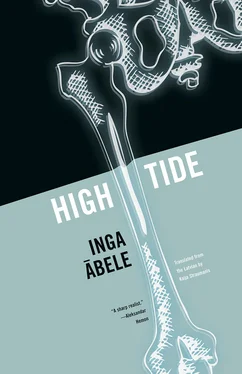When Andrejs met Ieva on the front steps of the hospital holding the baby, it seemed like several years had gone by instead of several days. Ieva looked disheveled and bright-eyed — unfamiliar. She had probably expected a flower from him, but he didn’t have one. She shouldn’t expect something from him that he wasn’t going to give.
He looked at his daughter — cute. He called for a taxi. So be it.
But he fell asleep in the cab. No surprise since he hadn’t slept much the last few nights. A cast-iron stove had smoked away in the loggers’ barracks, and all night there was nothing but charcoal and the howling of the village dogs. Now and then he’d light a cigarette and listen to the snoring of the other workers. The heavy night pressed the smoke down and constricted his chest. But maybe it had been from the excitement that he now had a daughter.
The taxi driver woke him when they were already back at the house:
“Wake up, Dad! You should’ve carried your newborn in yourself!”
The yard was empty. Ieva had already run inside with the baby to hide her tears.
He’d slept through it.
Ieva, of course, was silent for the next few days. His daughter obviously meant nothing to him if he could just fall asleep like that. Did he do it on purpose? Wasn’t he happy? He was happy; he just couldn’t show it on the outside like everyone else.
In his opinion, Ieva’s sadness was a huge cover for how spoiled she was. Both of her parents had worked and her mother had migraines, so they couldn’t keep both Ieva and her little brother. They had sent Ieva off to the countryside to live with her grandmother, but that’s where all hell had broken loose. She hadn’t had real life conditions there, the way he saw it. It was like living in a conservatory. Books. Laziness. The sea. Her Gran did everything for her. And the little princess just lay on the couch, reading — and from the age of four!
Andrejs hated know-it-alls. Smart people. Writers. Who needs them? Fine, everyone can come up with one great thought in their lifetime, a single, strong thought that’s their own. You can’t run on empty, so to speak. Something goes on up there, all the time.
Alright — two great thoughts in a lifetime, like Andrejs had.
Yes, he can count two great thoughts of his. The first is the one he’d love to remind Ieva of, in case she’d forgotten. That, despite everything that’s happened, plus prison, he never turned into some pig.
They say your own people will get it. He won’t explain anything more to anyone else. Those who don’t get it can just drop it. Who needs explanations. He won’t say anything more. It’s such a massive thought and so completely applies to him that chills run through his body when he repeats it to himself and fully realizes it.
The second thought is about life. He’ll tell Ieva about it someday. And she and all her smart people will pale at the idea. Because they’re all liars. Shelves stuffed full with books. Fakes! Because a person can come up with one, two great thoughts in his lifetime, but then there are people who knock out a book a year. It’s obvious to Andrejs that they just make money in the name of boredom. That’s how that world works — the less sense you have, the more others will take advantage of you.
Three thoughts, what lies. Three is impossible.
He’s told Ieva that. She drove him nuts with her talking, pissed him off. He had felt so unprotected, so forced into solitude and darkness, that he had screamed it right into her face — I hate know-it-alls!
She’d screamed back — but I crave knowledge!
A yeller. She’d been consistently raised like that, to be proper and positive. Undisciplined and lazy.
Oh, Ieva. His Ieva. What’s wrong with him!
At times he’s actually pretty scared. Things will just fall into place and this wave builds up inside him. Then he becomes afraid of himself. Something hidden deep within him shifts; something he’s never known and will never know about. At moments like that, both life and death seem trivial, and an intense pain rips through his heart. No, not pure pain, but some kind of twisting, a rope of aching, longing, rage, hope, and dread; it runs so deep that it constricts his entire chest.
He can’t breathe and he’s afraid of himself. At moments like that he’s happy his heart has destined him for loneliness. God forbid someone else has to have this wave crash over them as well. Only Andrejs can bear that weight. He holds this wave like Atlas holds the world on his shoulders.
The woman resting on his shoulder moves. His collarbone must be digging into her cheek.
Andrejs quickly reaches his free hand behind his back to grab a cushion, and tosses it in the corner of the couch. Then he puts his arms around the woman and draws her down with him. There’s a tickle in his chest, and even though this movement lasts maybe a second, he feels like he’s caught a giant fish and is sinking into the depths of the ocean.
The woman mumbles and doesn’t want to lie down, and struggles a bit, the idiot, she probably thinks he’s going to start groping her, but he doesn’t intend to. Alright fine, maybe he thought about it a little, but he’s only human, he can see she’s tired from work, and also from preparing the roast, so let her just sleep. Her cheek presses against his shoulder, a string of drool hangs from the corner of her mouth onto his shirt like a silvery thread.
“Sleep!” he strokes her hair. And sniffs it. Strange. Her scent isn’t really something that would make him want her right now. He sensed that from the start. But he can’t exactly push her away, either. Like there’s a secret flowing through her. That’s a good thing. He likes a woman with a secret.
She makes a noise like a content cat when he strokes her hair, then drifts off again. Makes sense — it’s nice with the two of them together. Close, cozy.
And it’s nice here in the warmth, nice for Andrejs to think about Ieva without interruption. These thoughts always drag him away from wherever he is, carry him through the air and to a strange and enormous house, where it takes a long time to inspect and check all the cellars, intersecting hallways, antechambers, rooms, mansards, stairwells, pantries, attics, guest rooms and hidden passageways, and then clean and catalog them until next time. Tonight he’s just getting started. Until he’s made it through it all. Let this Demeter sleep. There’s nothing left to miss out on. That’s how time works.
Ieva’s visits were beautiful in their slow pace. There was no rush. “We’ll be back tomorrow at ten!” the guards would remind them as they left. And then time would suddenly start back up for Andrejs, whose life orbited a bewitched circle, where the same actions took place every morning, every night, and every year, forever winding up back at the beginning; a life where the mirrors are frozen and always reflect the same image. He had been shunned from time both physically — in prison — and spiritually — within himself.
But then one morning Ieva would show up and time would start again.
Even the guards noticed it because they said they’d be back in the morning to separate them. Andrejs suddenly became worthy of keeping track of time — this body the court had sentenced to age hidden from sight. Something overflowed and pushed out, the floodgates burst open — a powerful torrent rushed forward from 10 am through 10 am the next day, and it took his breath away to see how elastic and shifting time was, how material and flowing it was.
On those days he hated the clock. On those days the clock once more had meaning, and it mocked him as much as it could, like someone born to be a prison guard — someone with tormenting in their blood, someone who makes sure you’ll never forget them.
Читать дальше












